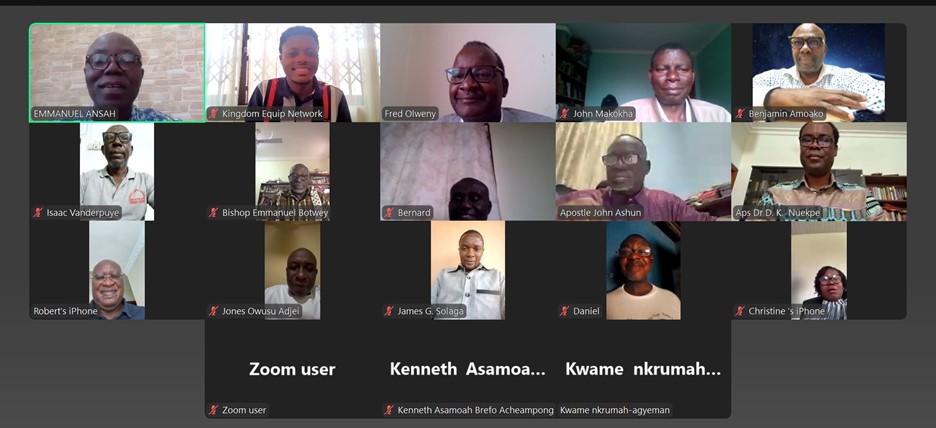- August 18, 2025
- Posted by: kingdomequipnetwork_tempadmin
- Category: News

A diverse group of church leaders from across Ghana has completed a landmark five-day training program on succession management, designed to strengthen leadership continuity and prevent disruptions during transitions.
The virtual course, held from Monday, July 28 to Friday, August 1, 2025, was organized by CORAT Africa (Kenya) in partnership with the Kingdom Equip Network (Ghana). It brought together participants from 11 different churches, including Bishops, Apostles, Reverend Ministers, Pastors, Missionaries, and Elders from denominations such as The Church of Pentecost, Global Revival Ministries, and Christian Faith Church International.
Filling a Critical Gap in Church Leadership
The training was developed in response to recurring challenges that many churches face when leaders retire, step aside, or pass away. Too often, ministries experience crises due to poor planning, overreliance on charismatic personalities, and lack of documentation.
“Our churches are growing, but leadership transition remains a fragile area,” said Rev. Dr. Emmanuel Ansah, Convenor of Kingdom Equip Network, one of the lead facilitators. “This program is about building structures that ensure continuity, not confusion, when it’s time to hand over.”
Equipping Leaders with Biblical and Practical Tools
Over the five days, participants engaged in devotional sessions, lectures, and group discussions on themes such as:
- Biblical models of succession (e.g., Moses and Joshua, Elijah and Elisha).
- Signs of leadership fatigue.
- Governance and policy frameworks.
- Phased versus abrupt transitions.
- The role of outgoing leaders.
- Institutionalizing mentorship.
- Managing emotions and conflict in leadership change.
- Consequences of Poor Succession
Facilitation was provided by a team of seasoned leaders, including Rev. Dr. Oliver Kisaka, Fred Olweny, and Dr. John Makokha of CORAT Africa, Rev. Dr. Emmanuel Ansah of Kingdom Equip Network, and Apostle Alexander Kumi-Labi of The Church of Pentecost.
Leaders Share Transformational Insights
Participants described the course as both spiritually enriching and practically empowering.
“I think the entire content has been very helpful to me. I am revising some notes about our transition process …,” said Bishop Emmanuel Kweku Botwey, General Overseer of Christian Faith Church International. “I can say that the whole course has been very helpful to me.”
Another participant, Rev. Dr. Robert Ampiah-Kwofi, General Overseer of Global Revival Ministries, added: “This has been fantastic and I highly recommend it. I am at the stage of life where these lessons are very important, and I have found them enlightening and very beneficial.”
Strengthening Mentorship and Collaboration
Key outcomes included a renewed commitment to mentorship, the creation of intentional leadership pipelines, and stronger collaboration among ministries. Participants also pledged to train multiple successors for each key role to prevent leadership vacuums.
The awarding of Certificates of Completion marked not only the end of the training but also a symbolic charge to leaders to implement what they had learned in their churches.
Recommendations for the Future
Participants urged organizers to extend the program to regional levels so more pastors and leaders can benefit. They also recommended that churches:
- Integrate succession planning into their constitutions.
- Develop clear governance and policy frameworks.
- Keep proper documentation of leadership decisions.
- Establish follow-up programs to track progress after training.
Ensuring the Next Generation Inherits Strong Ministries
The course closed with a strong call to action: succession must become a national priority for churches in Ghana.
“Leadership is not just about today,” said Rev. Dr. Emmanuel Ansah during the final session. “It is about tomorrow – about preparing the next generation to continue the mission faithfully.”
As participants left with new tools and renewed conviction, the message was clear: with intentional planning and mentorship, Ghanaian churches can remain vibrant and resilient from one generation to the next.









